William Haggard was the pseudonym of Richard Henry Michael Clayton, the son of the Rev. Henry James Clayton and Mabel Sarah Clayton. He was an English writer of fictional spy thrillers set in the 1960s through the 1980s, or, as the writer H. R. F. Keating called them, "action novels of international power." Like C. P. Snow, he was a quintessentially British Establishment figure who had been a civil servant in India, and his books vigorously put forth his perhaps idiosyncratic points of view. The principle character in most of his novels is the urbane Colonel Charles Russell of the fictional Security Executive,, who moves easily and gracefully along Snow's Corridors of Power in Whitehall. During the years of the fictional spy mania initially begun by the James Bond stories, Haggard was considered by most critics to be at the very top of the field.

A Man About a Dog is a 1947 thriller novel by the British-Australian writer Alec Coppel. Driven to distraction by his wife's repeated affairs, her husband decides to kidnap her latest lover and commit the perfect murder, only to be thwarted by a dog.
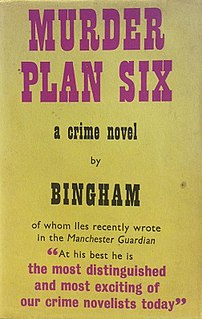
Murder Plan Six is a 1958 thriller novel by the British writer John Bingham. It was released in the United States by Dodd Mead the following year.
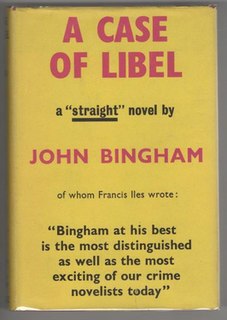
A Case of Libel is a 1963 novel by the British writer John Bingham. Unlike his usual crime-thrillers, it is a drama about a libel case brought by a woman against a national newspaper headed by a ruthless new editor.

Mr. Denning Drives North is a 1950 thriller novel by the British-Australian writer Alec Coppel. When successful and happily married aircraft manufacturer Tom Denning attempts to commit suicide by crashing a plane, detectives uncover a murder in his past background that has driven him insane with guilt.
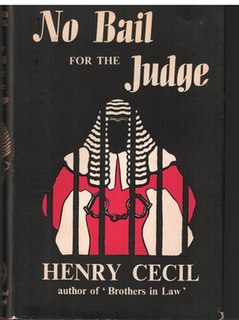
No Bail for the Judge is 1952 comedy crime novel by the British writer Henry Cecil. It was published in America by Harper Publications. It was the second novel of Cecil, himself a judge, and along with Brothers in Law is one of his best known.

Printer's Error is a 1939 mystery detective novel by the British writer Gladys Mitchell. It is the tenth in her long-running series featuring the psychoanalyst and amateur detective Mrs Bradley.

The Toff Goes to Market is a 1942 crime thriller novel by the British writer John Creasey. It was the eighth in his long-running featuring the gentleman amateur detective The Toff. It was one of a number of novels produced in the era that featured the booming wartime black market as a major plotline. It has been republished on a number of occasions.

Uneasy Terms is a 1946 crime thriller novel by the British writer Peter Cheyney. It was the seventh and last in his series featuring the London-based private detective Slim Callaghan, a British version of the hardboiled heroes of American writing.

Dark Duet is a 1942 spy thriller novel by the British writer Peter Cheyney. Cheyney had become known for his hardboiled crime thrillers featuring Lemmy Caution and Slim Callaghan, but this novel was his first fully-fledged espionage novel. The novel is set in wartime London, Lisbon and Ireland. It was published in the United States with the alternative title The Counterspy Murders.

Hangman's Curfew is a 1941 mystery detective novel by the British writer Gladys Mitchell. It is the twelfth in her long-running series featuring the psychoanalyst and amateur detective Mrs Bradley.
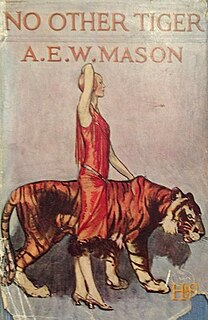
No Other Tiger is a 1927 mystery thriller novel by the British writer A.E.W. Mason. Julius Ricardo, who features in the Inspector Hanaud series, briefly appears and Hanaud himself is mentioned in passing.
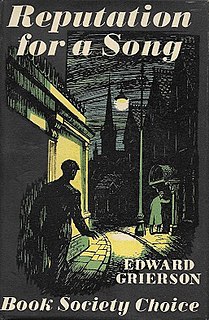
Reputation for a Song is a 1952 crime novel by the British writer Edward Grierson. It is an inverted detective story, breaking with many of the traditions of the established Golden Age of Detective Fiction. A young man is placed on trial accused of murdering his father. Its conclusion rests on interpretations of the presumption of innocence.

The Second Man is a 1956 crime novel by the British writer Edward Grierson. It won the Gold Dagger award of the Crime Writers' Association.
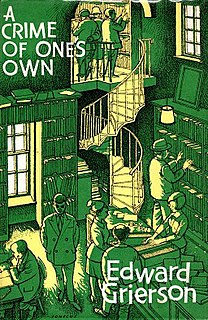
A Crime of One's Own is a 1967 crime novel by the British writer Edward Grierson.
Lynn Brock (1877-1943) was the pseudonym of the Irish writer Alister McAllister, who moved to England and wrote a series of mystery novels. Brock is best known for his series of Colonel Gore detective novels, which enjoyed popularity in the 1920s and 1930s during the Golden Age of Detective Fiction. His novels employ a complexity of style and are generally set in rural locations. He also wrote several plays under the name Anthony Wharton.
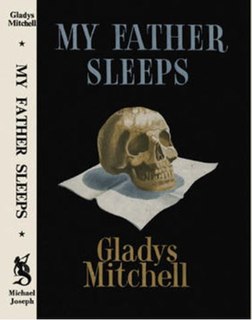
My Father Sleeps is a 1944 mystery detective novel by the British writer Gladys Mitchell. It is the seventeenth in her long-running series featuring the psychoanalyst and amateur detective Mrs Bradley. It is set in the Western Highlands of Scotland.

Found Floating is a 1937 detective novel by the Irish writer Freeman Wills Crofts. It is the sixteenth in his series of novels featuring Inspector French, a Scotland Yard detective of the Golden Age known for his methodical technique.

The Venner Crime is a 1933 detective novel by John Rhode, the pen name of the British writer Cecil Street. It is the sixteenth in his long-running series of novels featuring Lancelot Priestley, a Golden Age armchair detective. In Britain it was published by Odhams Press, the only one of his works be done so, while in the United States it was handled by his usual publisher Dodd Mead. It has been described as a sort of sequel to his previous book The Claverton Mystery. Writing in the New York Times Isaac Anderson considered "This is not one of the best of the Dr. Priestley yarns, but it is plenty good enough to pass an idle evening."
Salute the Toff is a 1941 crime thriller novel by the British writer John Creasey. It is the sixth in his long-running featuring the gentleman amateur detective The Toff.

















